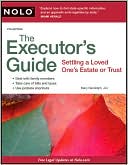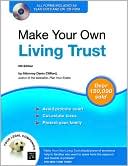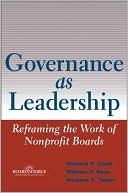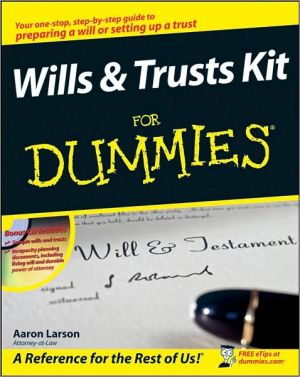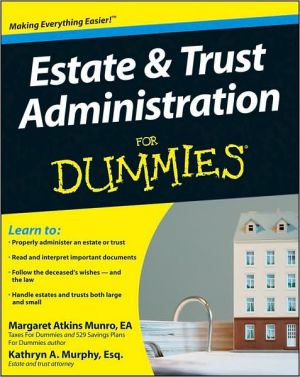The Executor's Guide: Settling a Loved One's Estate or Trust
Search in google:
Settling an estate can be like moving through a maze -- let The Executor's Guide lead the way.If you're faced with wrapping up the affairs of a loved one who has died, you may feel overwhelmed by all the work ahead -- especially when you're grieving. But with the right legal and practical information, you can do it.The Executor's Guide will help you get organized and make progress one step at a time, by assisting you in navigating an unfamiliar land of legal procedures and terminology. The 4th edition contains updated tables outlining key points of each state's laws, the latest information on estate taxes and worksheets that help you stay organized and on track. Miami Herald "Explains how to find state-specific information, and an appendix sorts legalities by state."
Part I: Getting Ready1. OverviewA. What Executors DoB. What Trustees DoC. How Hard Will It Be?D. Emotional ConcernsE. How This Book Can Help2. If You're Asked to Be an Executor or TrusteeA. Executor or Trustee?B. The Executor's Role: An OverviewC. The Successor Trustee's Role: An OverviewD. Should You Accept the Job?E. Making the Job ManageablePart II: First Steps3. The First WeekA. Organ, Tissue, and Body DonationB. Physician's Certification and Death CertificateC. AutopsyD. Burial or CremationE. Funerals and Memorial ServicesF. Other Tasks During the First Few Days4. The First MonthA. Set Up a Filing SystemB. Order Copies of the Death CertificateC. Find the WillD. Find Other Documents That Leave PropertyE. Send Notifications of the DeathF. Keep Property SecureG. Sort Through Personal Belongings5. Claiming Life Insurance, Social Security, and Other BenefitsA. Life Insurance and Annuity ProceedsB. Social Security BenefitsC. PensionsD. Veterans BenefitsE. Wages Owed the Deceased PersonF. The Family AllowanceG. Other Possible Benefits and ClaimsPart III: Taking Care of the Estate6. Making Sense of the WillA. Does the Will Appear Valid?B. Reading the WillC. Gifts to Groups of PeopleD. When to Take a Second Look at the Will7. If There's No WillA. Who's in ChargeB. Who Gets What: The Basic RulesC. Understanding Key TermsD. If an Heir Has DiedE. Taking Care of Minor Children8. Taking InventoryStep 1: Look for AssetsStep 2: Make a List of AssetsStep 3: Estimate the ValueStep 4: Add Up DebtsStep 5: Determine How Title Was Held9. Managing Assets and Paying BillsA. Your Legal DutiesB. Keeping Good RecordsC. Setting Up an Estate or Trust Bank AccountD. Keeping Tangible Assets SafeE. Managing Cash Accounts and InvestmentsF. Paying Claims and DebtsG. Giving Property to BeneficiariesH. Selling PropertyI. Handling a Business10. Caring for Children and Their PropertyA. Immediate ConcernsB. Raising a ChildC. Managing a Child's PropertyD. Personal and Practical Issues11. TaxesA. OverviewB. The Deceased Person's Income Tax: Form 1040C. The Estate's Income Tax: Form 1041D. Income Tax on TrustsE. Federal Estate TaxF. State Inheritance and Estate TaxesG. Other TaxesH. Beneficiaries and TaxesI. Typical SituationsPart IV: Transferring Property12. Property That Doesn't Go Through ProbateA. Common Assets That Don't Go Through ProbateB. Joint Tenancy PropertyC. Tenancy by the Entirety PropertyD. Community PropertyE. Property Held in a Living TrustF. Real Estate That Qualifies as a HomesteadG. Property That Passes to Immediate Family by LawH. Salary or WagesI. Payable-on-Death Bank AccountsJ. Life Insurance ProceedsK. Individual Retirement AccountsL. Securities Registered in Transfer-on-Death FormM. Savings BondsN. VehiclesO. Pension Plan Distributions and Other Death BenefitsP. Real Estate Left by a Transfer-on-Death DeedQ. Personal Property in "Small Estates"13. Transferring Joint Tenancy and Other Survivorship PropertyA. Real EstateB. Bank AccountsC. SecuritiesD. VehiclesE. Savings BondsF. If Title Wasn't Cleared When the First Joint Tenant Died14. Transferring Community PropertyA. Your Transfer OptionsB. Community Property AgreementsC. State Probate ShortcutsD. When the Second Spouse Dies15. Claiming Money in Retirement PlansA. Retirement Plans: The BasicsB. Who's the Beneficiary?C. If the Surviving Spouse Is the BeneficiaryD. If There Is One Beneficiary, Not the SpouseE. If There Are Multiple BeneficiariesF. If a Trust Is the BeneficiaryG. If There Is No "Designated Beneficiary"H. If the Beneficiary Has DiedI. If No Beneficiary Was NamedJ. If the Estate Is the Beneficiary16. Claiming Payable-on-Death AssetsA. If the Asset Was Co-OwnedB. The Effect of Divorce on POD BeneficiariesC. How Beneficiaries Can Claim Assets17. Special Procedures for Small EstatesA. Are You Handling a Small Estate?B. Claiming Property With AffidavitsC. Using Simplified Probate18. The Regular Probate ProcessA. Common Questions About ProbateB. The Typical Probate ProcessC. The Process in Uniform Probate Code StatesD. Probate in Another StateE. Disputes During ProbateF. Do You Need a Lawyer?G. If You Go It Alone: Working With the CourtPart V: Handling Trusts19. Wrapping Up a Simple Living TrustA. How Simple Living Trusts WorkB. If You're the Surviving SpouseC. Who Serves as Successor TrusteeD. The Affidavit of Assumption of DutiesE. What's in the TrustF. Notifying BeneficiariesG. Getting Valuable Property AppraisedH. Registering the TrustI. Debts and ExpensesJ. Transferring Trust PropertyK. Ending the Trust20. Managing a Child's TrustA. How a Child's Trust WorksB. The Trustee's JobC. Accepting or Declining the Trustee's JobD. Gathering Trust PropertyE. Communicating With BeneficiariesF. Registering the TrustG. Investing Trust PropertyH. Keeping Good RecordsI. Handling Trust TaxesJ. Distributing PropertyK. If You Want to ResignL. Ending the Trust21. Handling a Bypass (AB) TrustA. How a Bypass Trust WorksB. The Surviving Spouse's Rights and DutiesC. What's in the TrustD. Debts and ExpensesE. Getting Valuable Property AppraisedF. Notifying BeneficiariesG. Registering the TrustH. Dividing Trust AssetsI. Managing the Bypass Trust PropertyJ. Tax Returns for the Bypass TrustPart VI: Getting More Help22. Finding More InformationA. LibrariesB. The InternetC. Finding FormsD. Finding DefinitionsE. Researching Specific Questions23. Lawyers and Other ExpertsA. When to Get HelpB. Deciding What You Want From a LawyerC. Finding a LawyerD. Choosing a LawyerE. Working With a LawyerF. Paying a LawyerG. Problems With Your LawyerGlossaryAppendix: State InformationIndex
